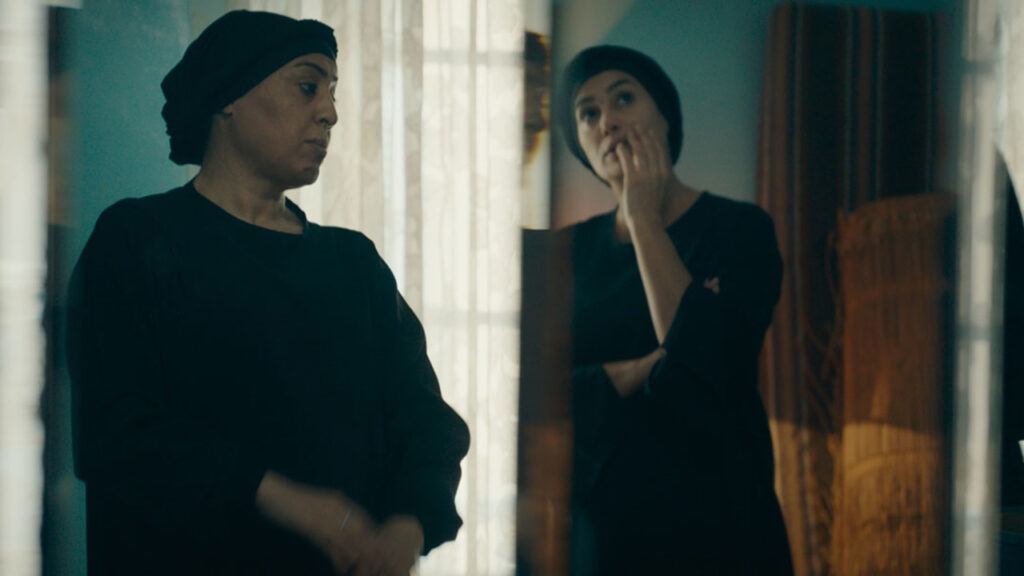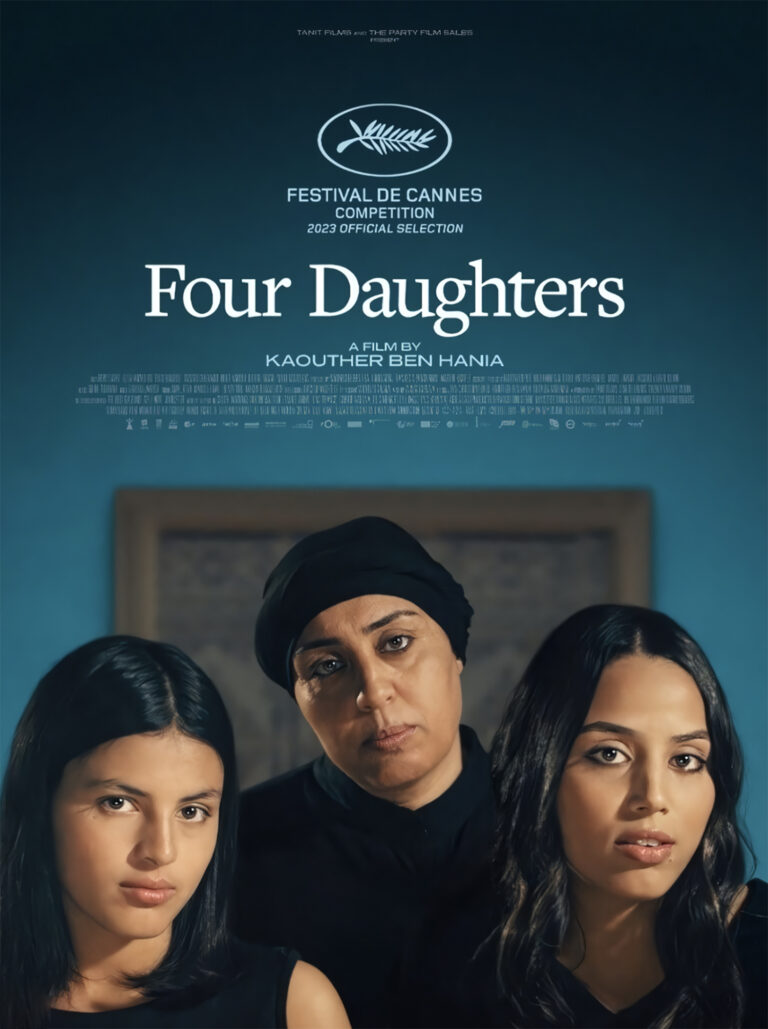Four Daughters – Snapshot
Four Daughters is a very different kind of documentary that raises many questions about artifice and filmmaking ethics as it tells a tough story of a broken family. (3.5*)
Where to Watch:
Stream:Netflix
Rent: Prime/YouTube/Fandango ($4) Apple ($5)
Four Daughters – The Oscar Buzz
Oscar Nominations (1) / Oscar Wins (0) :
Documentary Feature
Four Daughters was originally submitted to the Oscars as the International Feature from Tunisia. And what I suspect happened is that the judges found five other films to make it to that category, but still liked this one enough to find it a spot in another category. It is a very interesting documentary because it employs actors in several roles where either the real people are simply not available or the role is too emotionally demanding for the real person to play. So it ends up, at times, being a ‘documentary by re-enactment’. (I will have a lot more to say about this idea later.)
Tunisian-born Kaouther Ben Hania is the director for Four Daughters and is also credited with writing the screenplay. She is the filmmaker who was previously at the Oscars four years ago with her International Feature nominee, The Man Who Sold His Skin. While I enjoyed that movie “exploring the complex notions of being commodified and the motivation provided by the romantic interests”, I ended up thinking that the layering of the plight of Syrian refugees on top of that was unnecessary and, ultimately, unsuccessful. I ended up giving that film just 3.5* (i.e. the bottom of my recommended range.)
The only other members of The Man Who Sold His Skin team that I could identify working on Four Daughters was the composer, Amin Bouhafa and Ichrak Matar, the actress who plays the oldest daughter..
Four Daughters – Related Movies
The Man Who Sold His Skin: (Direction, Screenplay, Music, Matar (Ghofrane))
Four Daughters – What Others Think
The audience ratings for Four Daughters are based on a small number of viewers. Possibly that will change as more people see it, although a documentary in a foreign language is probably not real appealing to many viewers. It ranks fourth out of the five documentaries, based on existing ratings, ahead of only the Bobi Wine movie. But compared with all 38 nominated films, it is tied with Killers of the Flower Moon and Nyad at 21st, solidly in the middle of the pack. (Documentaries tend to have small but enthusiastic followers). Reviewers called it a “powerful film about generational trauma, memories, womanhood and culture” and “A Worthwhile Story Deserving of Better Treatment”. Another said simply “There is Potential”.
Critics also rated Four Daughters fourth in the documentary race and placed it slightly higher than the viewing public at 17th out of all 38 nominated movies, tied with May December, Perfect Days, and Io Capitano.
Critical reviews varied largely based on whether they liked the idea of ‘documentaries with actors’. Peyton Robinson (RogerEbert) noted that the actresses “act as inserts in reenactments of sisterly moments, embodying the space they’ve left behind in the present by taking on the depictions of their memory.” But Robinson also observed that the device may have limits: “When do questions become judgments? And… how much emotional weight are the actors expected to take on?” And later “…this throws reliability into question and morality, as the accuracy of retelling and the respect between actor and subject are muddled.” Jonathan Romney (Sight&Sound) observed that “the facts and fictions of a Tunisian family’s history blur in this fascinating hybrid documentary.”
Overall, Four Daughters ranks almost exactly in the middle of our 38 Oscar-nominated movies and fourth out of the five documentaries. The movie is a good, but not great, example of Oscar material.
Four Daughters – Special Mention
Re-enactment Documentaries – My initial understanding of Four Daughters caused me a little bit of angst because I couldn’t wrap my head around the notion that a “documentary” would include credited actors. A true “documentary” is a fact-based movie that explores real-life events – that almost always occurred in the past – but does so using the people actually involved in that event. So documentaries typically include “talking heads” giving us their impressions of the people and history, and, frequently include videos or still photographs of the actual events and people.
A documentary might include a sequence or two of “re-enactments” which involve re-creating an event. The intent is to give the viewer an idea of exactly what happened, even though a precise recording of it does not exist. In a real sense, then, re-enactments are not the same thing as what actually happened, but because they use the same people, the re-enactment is assumed to have some fidelity to the original event.
But what is it when no recording of the original event exists and one or more of the original characters is simply not available to stage the re-enactment? Such is the case in Four Daughters where the original events were never subject to recording and two of the four are simply not available to play their parts. Although not dead, the two eldest daughters in this story are, shall we say, in such conditions that they could not possibly have participated in the filming of the story. But the filmmaker, Kaouther Ben Hania, thought that the story couldn’t be told without some kind of presence on their part. So she hired actors to play their roles and wrote scripts for what they should say.
But she went beyond filling their roles with actors. Ben Hania also brought in an actor to play the Mother, Olfa, whenever the re-enactments became too emotionally difficult for her. Clearly the boundaries defining the genre “documentary” are being substantially blurred.
Four Daughters – Michael’s Moments
Four Daughters is at least as interesting in its form and creation as it is in its subject matter. The film tells the real life story of a Tunisian mother’s struggle to raise four daughters made more difficult by the presence of unhelpful men and a setting in the middle of political turmoil and the conflicts between Muslim religion and modern secular culture. That story alone is worth seeing this movie. The exploration of this all-woman family is enlightening for both its similarities to U.S. family life and the almost alienating features of rigid Muslim fundamentalism. Indeed, some of the most interesting parts of the movie are when the Four Daughters are acting like teen-age sisters laying in bed, braiding each other’s hair and talking about boys, sex, and coming of age. Despite their many serious issues, they are, ultimately, normal teen-age girls.
But they aren’t all sisters. As noted in the Special Mention section, this is a “re-enactment documentary” and the two eldest daughters, Ghofrane and Rahma, are played by professional actresses. On occasion, so is the mother, Olfa. The result is a unique twist on the “documentary” format.
Some of the differences are intriguing and informative. It is very strange and a bit surreal to see the actress Olfa trying to interact with the daughters while the real Olfa stands leaning against a door jam watching attentively. (And, yes, the camera puts both of them in the same frame!) But then it gets even stranger when the real Olfa starts instructing the actress Olfa, telling her to behave differently or to say something differently to her own daughters. One assumes that the real Mother is trying to inject a more accurate version of what actually happened – but it is also possible that she is doing what anyone would do and paint the picture with a more flattering brush? We don’t know, and, obviously, neither does the filmmaker because she wasn’t there when the real events happened.
There are other instances where the “re-enactment” becomes a jarring distraction. Men did exist in the lives of this family, although not exactly happily. In another interesting decision, Ben Hania, uses a single male actor to portray all the men in this film. I believe that signifies that the men involved in this family are, essentially, inconsequential and largely interchangeable – it might have been done as a cost-cutting move, but it adds a definite level of messaging. However at about 41 minutes, in a particular re-enactment, the male actor actually requests the filming be stopped, he gets up to have a conference with the director, and he refuses to continue participation in that particular scene. The camera, meanwhile, keeps on rolling capturing all this reticence, but failing to fully explain the actors rationale. We know he feels extremely uncomfortable continuing the enactment, but we never understand why. It is an intriguing interruption but we do not get an understanding of what this has to do with the story of the Four Daughters. So, sometimes, Ben Hania’s artifice overwhelms the real story she is trying to tell.
Then there is another, ethical problem with this “re-enactment documentary”. I mentioned that there is an actress who plays the Mother, Olfa, during scenes where the real Olfa is too overwhelmed with emotion to play them herself. And, at times, the real Olfa guides the actress Olfa on what to say and to feel. But sometimes the actress Olfa begins to tell the real Olfa how she has made mistakes in her life and that she isn’t raising the girls properly. I wonder since when does an actress inject herself in the real world telling people how they should behave or feel? I can understand asking questions to get at the proper emotional mindset, but to actually suggest a different story suggests a bit more than acting – she is almost acting as a parent to the real mother. How would that ever be justified?
And that idea actually injects an important question into the discussion of Four Daughters. Is this a movie or is it a filmed therapy session for a broken family? A documentary is supposed to tell an existing story, not create a brand new one. And yet, repeatedly, the replacement of the two older sisters ends up having a feedback effect on the entire family dynamic. We see several times that the two real daughters are actually seeing in these two other women another version of their own absent sisters. They laugh, giggle, and do sisterly things – were they acting or did it become their new reality? There is a poignant discussion between the two real daughters towards the end of the movie where you can tell that they have achieved a deeper understanding of their loss and have made substantial progress in dealing with it. Of course that’s a good thing. But is it right that we witnessed it too?
Four Daughters uses a unique device to explore the inner workings of a family of women in a difficult environment. There is great depth to much of what they are feeling. At times, though, I almost felt like a voyeur and that I was intruding on some of their most sensitive thoughts. As Joan said after watching it, it was a group therapy session caught on film and labeled a documentary. The movie deserves a careful but cautious viewing. (3.5*)


